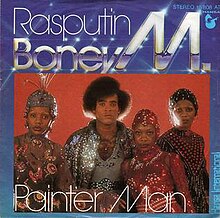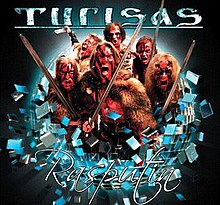Rasputin (song)
| "Rasputin" | ||||
|---|---|---|---|---|
 |
||||
| Single by Boney M. | ||||
| from the album Nightflight to Venus | ||||
| B-side | "Painter Man" | |||
| Released | August 28, 1978 | |||
| Format | ||||
| Recorded | May 1978 | |||
| Genre | ||||
| Length | 4:42 | |||
| Label | ||||
| Writer(s) |
|
|||
| Producer(s) | Farian | |||
| Boney M. singles chronology | ||||
|
||||
| "Rasputin" | ||||
|---|---|---|---|---|
 |
||||
| Single by Turisas | ||||
| Released | September 21, 2007 | |||
| Recorded | 2007 at Sound Supreme Studio, Hämeenlinna | |||
| Genre | Folk metal | |||
| Length | 8:19 | |||
| Label | Century | |||
| Writer(s) |
|
|||
| Producer(s) | Mathias Nygård | |||
| Turisas singles chronology | ||||
|
||||
"Rasputin" is a 1978 euro disco hit single by the Germany-based pop and euro disco group Boney M., the second from their album Nightflight to Venus. With a tune resembling the second half of the Turkish folk song "Kâtibim", it is a semi-biographical song about Grigori Rasputin, a friend and advisor of Tsar Nicholas II of Russia and his family during the early 20th century. The song variously sensationalizes Rasputin as a playboy, mystical healer, and political manipulator.
"Rasputin" references the hope held by Tsaritsa Alexandra Fyodorovna that Grigori Rasputin would heal her hemophiliac son, Tsarevich Alexei of Russia. It also claims that Rasputin was Alexandra's paramour: "Ra Ra Rasputin: lover of the Russian queen – there was a cat that really was gone" (although liberally rhyming the last syllable of his name with the word "queen"). As "Russia's greatest love machine", the "Moscow chicks" thought him lovely. The song claims that Rasputin's political power overshadowed that of the Tsar himself in "all affairs of state". When his sexual and political acts became intolerable, "men of higher standing" plotted his downfall, despite the fact that "the ladies begged" them not to. Although the song states "he was a brute", it claims that the ladies "just fell into his arms."
The end of the song recounts a modified version of a popular description of the events that culminated in Rasputin's assassination, as perpetrated by Felix Yusupov, Vladimir Purishkevich, and Dmitri Pavlovich, on December 16, 1916 (O.S.).The song claims that Rasputin's assassins fatally shot him after he survived the poisoning of his wine.
...
Wikipedia
